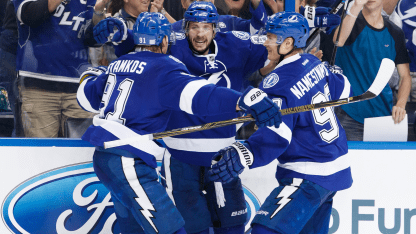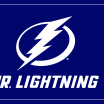The last time the Tampa Bay Lightning took on the New York Islanders, the Bolts benefitted from a handful of early power plays, scoring twice with the man-advantage to open a 3-0 lead following the first period in Brooklyn, one of the rare times so far this season the Lightning have been ahead after 20 minutes.
Special teams making a difference for Lightning
To date, Tampa Bay has tallied 13 power-play goals this season while allowing only five.

Sparked by their special team efficiency, the Bolts would go on to defeat the Islanders 6-1, Lightning head coach Jon Cooper calling the power play the difference in his post-game comments.
For a Lightning team preparing for Thursday's rematch against the Islanders at AMALIE Arena, special teams have been the difference maker in a number of their early-season contests.
To date, the Bolts have scored 13 power-play goals and have tallied a power-play marker in seven of 13 contests, their four-game streak of games with a power-play goal coming to an end in a 0-for-3 performance Monday at Florida.
Additionally, the Lightning have allowed only five power-play goals this season.
The current plus-eight special teams goal differential is the best the Lightning have ever had in franchise history through 13 games, one goal better than their plus-seven mark through the first 13 games of the 2010-11 season.
So what accounts for the Bolts' special teams being so, well, special to start 2016-17? Are they spending more time in practice on special teams? During Wednesday's practice session ahead of the game against the Islanders, the Lightning used a sizable portion of their time drilling power-play and penalty-kill work.
Is it new assistant coach Todd Richards, who has brought in some fresh ideas for how to better the Bolts' power play and has headed up that unit through training camp and into the regular season?
Or is it a case of the Lightning returning nearly their entire roster from back-to-back deep playoff runs and those players finding more comfort in the special-teams systems?
Cooper thinks the answer lies somewhere in the middle of all three aforementioned theories.
"Our penalty kill has been pretty good over the last couple of years, and so when you keep that cohesive unit, it's usually beneficial," he said. "The other thing is, you know, we've got good goaltending. That's your best penalty killer, so when they're playing well that helps. I think the big difference is our power play's been scoring goals and a little bit more of an attack mentality when we have the puck. It's been helping us. So far during this year we've really needed our special teams because it's bailed us out of a couple of games, especially when we've fallen behind. If you want to have success in this league, it's good to have good special teams, and, so far so good."
The Lightning penalty kill ranks seventh in the NHL as of Wednesday morning at 87.8 percent. But that successful penalty kill rate has been the norm over the past couple seasons. In 2015-16, the Bolts also ranked seventh in the league at 84 percent. The season before that, Tampa Bay came in tied for seventh at the end of the regular season at 83.7 percent.
The difference this season, it seems, is on the power play, where a much-maligned unit a year ago has been a source of pride for the Lightning in the early stages of 2016-17. The Lightning own the league's fifth-best power play and are converting 25.5 percent of their man-advantage opportunities, meaning the Bolts are scoring on slightly more than one out of every four power plays.
Last season, despite advancing within a game of a return trip to the Stanley Cup Final, the Lightning just weren't that good on the power play, converting at a rate of only 15.8 percent and ranking tied for 26th, almost at the bottom of the league standings.
Only Toronto (15.4 percent) and Winnipeg (14.8 percent), teams that missed the postseason by a wide margin, finished with a lower power-play success rate.
Tampa Bay fared better two seasons ago, converting 18.4 percent of its power-play opportunities, good for 14th in the league.
Still, with all of the offensive talent on the Bolts' roster, the fact they're not annually a top ten team in the league for power play is a bit of a surprise.
"It's definitely been an area we need to work on," Lightning captain Steven Stamkos said. "It's been an Achilles heel of ours in the past where we know we have the talent on this team to have an effective power play. I think the penalty kill has been something that has been able to grow the past couple of years and has been one of the best in the league. Guys on the power play knew we had to be a lot better. We've implemented obviously Todd Richards into the equation and a fresh voice, and something like that can spark things. But the players that have been on it know we have to be a lot better, and we have been so far this year."
Richards' tinkering combined with the players taking ownership of the special-teams unit has led to the positive results the Bolts have experienced so far on the power play.
"The guys have to realize we have a special group of offensive players and that doesn't just necessarily translate into a good power play," Stamkos said. "We've seen that in the past where we've struggled. We've come together a little more this year with the mentality of going out there and maybe simplifying a little bit. Obviously, Todd is a fresh voice in there and has some ideas from his coaching experience. It's something that's helped as well."
The Lightning's power-play unit and special teams as a whole have helped them win games in 2016-17.
Keeping those special-teams numbers at or near the top of the league will play a big role in determining just how far the Bolts can go this season.


















